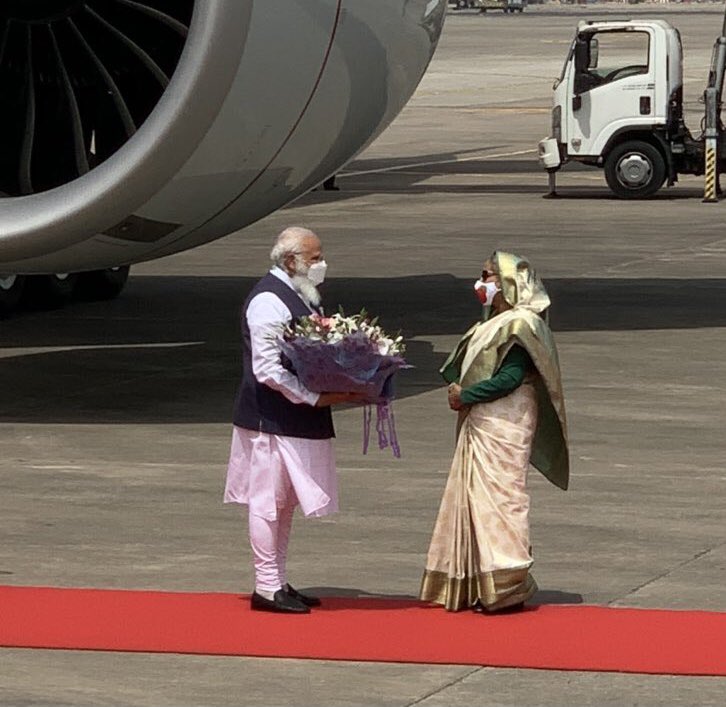
Prime Minister Narendra Modi's visit to Bangladesh was historic. He visited a country that has completed 50 years as an independent nation, after a frightful and bloody war against Pakistan. The country and its leaders acknowledge the moral and tactical support that India provide the Bangladeshis.
Modi too underlined the common heritage, common development, common goals and common challenges that bring the two neighbours together. India Narrative brings snippets and sidelights from Modi's visit to Bangladesh.
India sends another 12 lakh vaccines to Dhaka as gift
It was not just Modi who arrived in Bangladesh. Another 1.2 million Covid-19 vaccines arrived in Dhaka as a gift. India donated AstraZeneca's Covishield vaccine to its eastern neighbour on its most memorable day.
In February, India had gifted 20 lakh vaccines to Bangladesh free of cost. It was one of the initial neighbouring countries to have received the vaccines, enabling it to launch its countrywide vaccination from 7 February 2021.
Sheikh Hasina remembers her massacred family
Bangladeshi Prime Minister Sheikh Hasina thanked India for support during the independence in 1971 and vaccines in 2021. She emphasised upon the neighbourly, social, cultural and historical links between the two countries.
Remembering the military coup of 1975, she said: "I remember with great anguish, August 15 1975 – a dark night for Bangladesh when the Father of the Nation was assassinated. My mother, three brothers, two sisters-in-law, a 10-year-old brother, and uncle were brutally assassinated, and I remember all those who attained martyrdom that night.”
Bangladeshi peaceniks want March 25 as International Genocide Day
Bangladeshi anti-war crime campaigners also took to the streets to press the world for recognition of March 25 as the International Genocide Day by the UN. On this day in 1971, Pakistan had launched Operation Searchlight in Dhaka to crush the Bengali freedom struggle.
University teachers, journalists, lawyers, writers, doctors, engineers and other professionals under the 'One Bangladesh' platform organised dozens of rallies simultaneously in university campuses, the press clubs and other prominent places across the country to mark it as an international day. They also want Pakistan to apologise for its war crimes.
Radical Islamist group Hefazat-e-Islam clashes with police
It was not just the peaceniks who were carrying out rallies. The radicals too were busy. Clashes broke out between the police and the supporters of radical Islamist group Hefazat-e-Islam in Dhaka and Chittagong. Members of the radical group wanted to take out a protest against Prime Minister Narendra Modi's visit but were stopped by the police from doing so.
Reports said when the police tried to restrain them with teargas, the Islamists fired back. The violence took place near the Baitul Mukarram mosque after Friday prayers and scores of people had to be rushed to the hospital.
India and Bangladesh share Teesta and 54 more rivers
The Teesta river remains a point of friction between the two nations. However, with winds of friendship blowing between the countries, the leaderships are optimistic that water issues too will be resolved.
Not many people know that the two neighbours share 54 common rivers besides the Teesta. On his first visit abroad after the coronavirus pandemic surfaced, Modi assured Bangladeshi leaders that he will do his best to sign a treaty with Bangladesh on water-sharing of Teesta and other common rivers.
UK's Prince Charles sends video felicitations
Prince Charles congratulated the people of Bangladesh through a video message on Thursday. In his opening remarks, he said: "Assalamualaikum, ladies and gentlemen. I am so very pleased to be able to send my warmest congratulations and best wishes to everyone celebrating the golden jubilee of Bangladesh – here in the United Kingdom, in Bangladesh, across the Commonwealth and around the world.”
His mother, Queen Elizabeth II had conveyed her wishes through a press release issued by the Bangladesh High Commission in London.




















